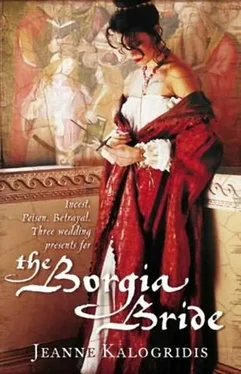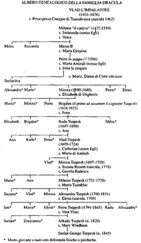This was no casual summons, nor a simple family conference: Cesare sat at a table with his sister in a grand hall, the two of them surrounded by no fewer than a hundred of the Captain-General’s armed guards.
That is all Lucrezia would tell me of the meeting-and that she only revealed gradually, over the course of several hours. She returned afterwards, so deeply shaken she dared not weep. But immediately on her return, she had little Rodrigo moved from the nursery permanently into her chambers. I have no doubt Cesare reiterated his threat on the child’s life, lest Lucrezia publicize the murder or make any appeals to her father that would cause Alexander to sympathize with Naples instead of Cesare’s choice, France.
Within a day after her harrowing encounter with Cesare, Lucrezia’s tears returned. She refused her father’s summons to supper, then to audiences, where he wanted her to sit on her little cushion on the step beneath his throne, as she had in the past.
Lucrezia would have none of it. She had cooperated to save her child, but her grief was too great, her rage too deep, to pretend that Alfonso’s murder had not happened. She lay in bed and ignored all her father’s appeals.
Alexander soon grew angry, to the point of sending Lucrezia a missive stating that he no longer loved her.
Lucrezia batted not an eye; her father’s disapproval no longer evoked in her desperate attempts to please. In response, she announced that she would seclude herself, along with her child, at a pastoral estate she owned in Nepi, just north of Rome.
She spoke as though she intended to remain there forever. No one dared tell her what all of Rome knew: that the Pope and Cesare were already planning her next marriage. Seeking the alliance that would bring the best political advantage for the House of Borgia. Meanwhile, Donna Maria busied herself with packing most of Lucrezia’s belongings-with the exception of the beautiful gilded and bejewelled gowns, worn in happier times. In Nepi, there would be no ceremonies, no celebrations, only the wearing of black.
Lucrezia desired to have me in her company at all times; I wondered why, since I could no longer show her the unrestrained warmth I had before her complicity in my brother’s death. Nor could I provide comfort: I was lost in my own grief, unable to emerge from it for anyone save my nephew. Perhaps she wanted my presence out of a yearning to be close to whatever reminded her of Alfonso; perhaps she did so out of guilt.
Regardless of her reason, she invited me to accompany her to Nepi. I accepted only because little Rodrigo was going; Donna Esmeralda took charge of gathering the belongings I would need during my long absence from Rome.
While armed soldiers stood outside my open antechamber doors (since Alfonso’s death, I was frankly guarded at all times, Lucrezia more subtly so), I sat in the bedchamber and supervised Esmeralda in her task. It had been more than a month since I had entered the rooms that had for so long been my home. In my absence, many things had been taken: the fine draperies, the silver sconces, the fur carpets and the gilded brocade coverlet from my bed.
Once again, I wanted little of Rome: no sumptuous gowns, only the plain black dresses I had brought with me as a new bride, which were better suited for mourning. I wanted my dog-eared copy of Petrarch, the slipper which had fallen from my dead brother’s foot, and little else.
While Esmeralda worried with my clothing, I went to my cache of jewels, hidden carefully in a secret compartment in my armoire, thinking that perhaps I should take a few of the most valuable of them-not because I wished ever to adorn myself again, but because I was already thinking of a possible escape from Nepi, if I could convince Lucrezia to bring the boy with us to Naples. I would need bribes for the guards, and money to run the household.
With that in mind, I surreptitiously pored over my casket of jewels, and hid the largest and most valuable of them between my breasts.
It was then I caught sight of the innocuous-looking slender glass vial, small and green amidst the glittering gems.
The canterella.
My heart skipped a beat. I still lived beneath the shadow of the darkest grief, and I knew I remained with Lucrezia at present only because of His Holiness’ tolerant attitude towards his daughter. Once Cesare persuaded Alexander, I would be either imprisoned or murdered. I had no desire to live as a prisoner of the Borgias-and I would not give Cesare the pleasure of being the one to take my life. I would far prefer eternity in Hell as a suicide.
I slid the little green glass vial beneath my bodice, into the special pocket for my now-confiscated stiletto. It fit neatly.
God Himself arranged the timing: no sooner had I hidden the vial than I heard marching in the corridor outside my door.
I rose, and was composed and calm when I faced Cesare’s soldiers, led by none other than the apologetic Don Micheletto.
‘Well,’ I said. ‘You have come for me at last.’
Late Summer 1500-Spring 1501

***
I was escorted to the Castel Sant’Angelo. Don Micheletto walked alongside me, and soldiers kept their distance both ahead of us and behind us, as if they had come merely to provide for my safety.
The entire event possessed an air of unreality, as though it were a dream; everything seemed false, illusory, save one single fact: Alfonso was dead.
Nevertheless, I reminded myself that I was a royal of the House of Aragon, and moved with grace and pride though surrounded by my captors. The guards blocked the gaping pilgrims and shoved the more curious ones aside as we marched through Saint Peter’s square, then onto the great bridge that led to the forbidding stone keep of Sant’Angelo.
I did not turn to look back at the Palazzo Santa Maria; my life there was slipping away from me, along with my sanity, like a hand being withdrawn from a glove. I was naked, bare. Alfonso was gone, little Rodrigo was gone, the trust I had put in Lucrezia was gone. Even my husband-who had impressed me earlier with his apparent loyalty-had abandoned me.
We walked along the bridge over the curving Tiber, leaden, fouled by the unseen corpses of Borgia victims. I prayed that I would soon join them.
Beside me, Micheletto spoke, his tone gracious and deferential. ‘His Holiness thought that a change of scenery might help ease your grief, Your Highness. We have arranged new quarters for you, which I hope you will find suitable.’
My face twitched with hatred. ‘Tell me, sir, is that a spot of blood upon your hand?’
Unwittingly, he actually lifted his hands and spread the fingers out, examining them; only after a glance at my expression of grim gloating did he lower them and attempt to hide his embarrassment at taking my question literally.
‘I thought so,’ I said. ‘Did Cesare have you kill my brother yourself, to make sure the deed was properly done?’
His smile faded; he made no further attempt at conversation until we arrived at our destination.
I had never before visited the Castel Sant’Angelo, and knew only of its infamy as a prison. I suspected I would be deposited in a filthy little cell with a bed of straw and chains upon the bare walls, and rusting iron bars in place of doors.
Don Micheletto and I strolled past well-tended gardens to a side entrance; there, he signalled for all but two of the guards to remain behind. I was led through corridors that reminded me of the palace where I had so long resided.
At last my guide opened the finely carved wooden doors to my ‘cell’. Inside lay my new apartments; in the antechamber, I recognized a chair which had been taken from my suite in the Palazzo Santa Maria; the floors were covered with my fur carpets. In the inner chamber on the bed was my brocade coverlet, and my drapes, and the silver sconce upon the wall. Beyond was a small balcony, overlooking more gardens.
Читать дальше
Конец ознакомительного отрывка
Купить книгу













